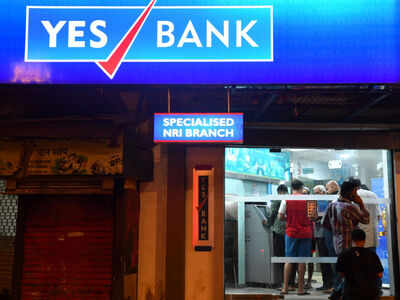
MUMBAI: Yes Bank’s deposits are understood to have shrunk far below the Rs 2 lakh crore reported at end September 2019. Thursday’s moratorium was preceded by withdrawals of bulk deposits following a downgrade in December 2019 itself. On Saturday, the bank also saw heavy retail withdrawals as it was plugged back into the interbank ATM network. Following this development, depositors could withdraw from any ATM in the country.
Traditionally, Yes Bank has been heavily dependent on bulk deposits. Only 40% of its deposit base is understood to have come from retail investors. While the bulk depositors cannot get out now because of the moratorium, they will be free to do so once the moratorium is lifted.
Meanwhile, the Reserve Bank of India (RBI) issued a statement on Sunday that concerns raised in sections of the media on safety of deposits in certain banks is based on an analysis that is flawed. “Solvency of banks is internationally based on capital to risk weighted assets and not on market capitalisation. The RBI closely monitors all banks and assures depositors that there is no such concern of safety of deposits in any bank,” the RBI said.

Banking sources said that liquidity was not going to be a problem as the RBI would provide a liquidity facility to the bank given present circumstances. The Tirumala Tirupati Devasthanam had withdrawn Rs 1,300 crore from Yes Bank in October 2019, while the Vadodara Smart City Development had withdrawn its deposits of around Rs 265 crore just days before the moratorium was imposed. An undertaking of the Maharashtra government too had withdrawn deposits from the private lender.
The bank’s advances at Rs 2.2 lakh crore as of end September were already higher than the deposit base (see graphic). The difference was funded by borrowings, including over $1 billion of foreign currency debt. Stemming the outflow of deposits would be a key challenge for the new management of the bank.
In the past, whenever a moratorium was imposed on a private bank, the failed bank was always merged with a public sector bank. This helped restore confidence as, with the re-branding, customers felt their deposits were guaranteed by the government.
In the case of Yes Bank, although SBI is coming in as an investor, it will continue to remain a private lender. Also, there will not be any re-branding and the ‘Yes’ brand will be retained.
Traditionally, Yes Bank has been heavily dependent on bulk deposits. Only 40% of its deposit base is understood to have come from retail investors. While the bulk depositors cannot get out now because of the moratorium, they will be free to do so once the moratorium is lifted.
Meanwhile, the Reserve Bank of India (RBI) issued a statement on Sunday that concerns raised in sections of the media on safety of deposits in certain banks is based on an analysis that is flawed. “Solvency of banks is internationally based on capital to risk weighted assets and not on market capitalisation. The RBI closely monitors all banks and assures depositors that there is no such concern of safety of deposits in any bank,” the RBI said.

Banking sources said that liquidity was not going to be a problem as the RBI would provide a liquidity facility to the bank given present circumstances. The Tirumala Tirupati Devasthanam had withdrawn Rs 1,300 crore from Yes Bank in October 2019, while the Vadodara Smart City Development had withdrawn its deposits of around Rs 265 crore just days before the moratorium was imposed. An undertaking of the Maharashtra government too had withdrawn deposits from the private lender.
The bank’s advances at Rs 2.2 lakh crore as of end September were already higher than the deposit base (see graphic). The difference was funded by borrowings, including over $1 billion of foreign currency debt. Stemming the outflow of deposits would be a key challenge for the new management of the bank.
In the past, whenever a moratorium was imposed on a private bank, the failed bank was always merged with a public sector bank. This helped restore confidence as, with the re-branding, customers felt their deposits were guaranteed by the government.
In the case of Yes Bank, although SBI is coming in as an investor, it will continue to remain a private lender. Also, there will not be any re-branding and the ‘Yes’ brand will be retained.
Download The Times of India News App for Latest Business News.
more from times of india business
Business News
LATEST VIDEOS
More from TOI
Navbharat Times
Featured Today in Travel
Quick Links
ELSS Mutual Funds BenefitsIncome Tax Refund statusWhat is AssochamITR Filing Last DateHome Loan EMI TipsHome Loan Repayment TipsPradhan Mantri Awas YojanaTop UP Loan FeaturesIncrease Home Loan EligibilityHome Loan on PFTax Saving Fixed DepositLink Aadhaar with ITRAtal Pension YojanaNita AmbaniIndian EconomyRBIAadhaar CardSBIReliance CommunicationsMukesh AmbaniIndian Bank Ifsc codeIDBI Ifsc codeIndusind ifsc codeYes Bank Ifsc CodeVijay Bank Ifsc codeSyndicate bank Ifsc CodePNB Ifsc codeOBC Ifsc codeKarur vysya bank ifscIOB Ifsc codeICICI Ifsc codeHDFC Bank ifsc codeCanara Bank Ifsc codeBank of baroda ifscBank of America IFSC CodeBOM IFSC CodeAndhra Bank IFSC CodeAxis Bank Ifsc CodeSBI IFSC CodeGST
Get the app







